Some Exhibits

Beez Neez now Chy Whella
Big Bear and Pepe Millard
Mon 11 Jul 2011 17:52
|
Just a Small Selection of the
Exhibits We Saw in MoMA - The Museum of Modern Art
  Pablo Picasso.
Girl before a Mirror - March 1932. Oil on Canvas.
Henri Matisse (1869-1954) Bather - 1909. Oil on
canvas.
In July 1909,
summering with his family in the South of France, Matisse worked on a commission
from Russian businessman Sergei Shchukin. The artist's plan originally included
a composition of bathers, to which this canvas relates. As Matisse worked on
Bather he made many adjustments in pencil and paint to the form and pose of the
figure. He repositioned the bather on the canvas, modeling the body's volumes
and adjusting earlier contours with long, repeated brushstrokes. A decisive
bloke then.
  Pablo
Picasso (1881-1973) Nude Seated on a Rock. Summer
1921. Oil on Canvas. Also Picasso, The Rape. 1920.
Tempera on wood.
  Tom Wesselmann
(1931-2004). Great American Nude 2. 1961. Amedeo
Modigliani (1884-1920). Reclining Nude. 1919. Oil on
Canvas.
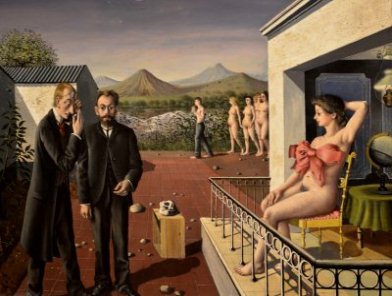 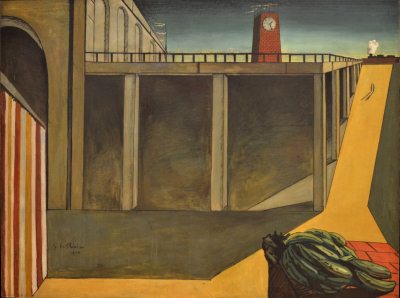 Paul Delvaux (1897-1994). Phases of the Moon. 1939. Oil on Canvas. Giorgio de Chirico
(1888-1978). The Melancholy of Departure. 1914. Oil
on Canvas
  Claude Monet (1840-1926). Agapanthus. 1914-1926. Oil on Canvas. Fernand Leger
(1881-1955). The Baluster. 1925. Oil on
Canvas.
 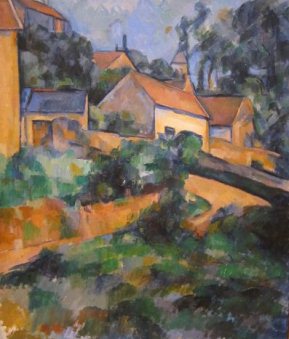 Paul Cezanne. (1839-1906).
Self Portrait in a Straw Hat 1875-76
and Turning Road at Montgeroult. 1898.
Both oil on Canvas.
  Natsuyuki Nakanishi (born 1935). Compact Object. 1962. Objects embedded in polyester. John
Chamberlain (born 1927). Tomahawk Nolan.
1965.
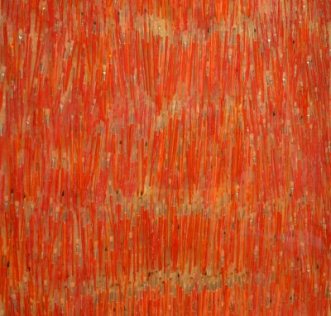  Arman. (1928-2005). I Still Use Brushes. 1969. Brushes embedded in plastic, in
acrylic box. Robert Smithson (1938-1973). Mirror
Stratum. 1966.
  Max Ernst (1891-1976). Napoleon in the
Wilderness. 1941. Paul Gauguin (1848-1903). Washerwoman. 1888. Oil on Canvas.
  Morris
Hirshfield (1872-1946). Girl in a Mirror. 1940 also Tiger. 1940. Both oil on
Canvas.
 Roberto
Matta (1911-2002). The Vertigo of Eros 1944. Oil on
canvas, is what Matta called an "inscape," one of a series of imaginary
landscapes he conceived of as a projections of his psyche. In 1939, to escape
the war in Europe, Matta emigrated from Paris to New York, where he stayed until
1948. His use of spontaneous, unplanned "automatic" drawing and his interest in
mysticism, evident in paintings such as this, had a tremendous influence on many
New York - based artists. Together with other Surrealists in exile, he quickly
made acquaintance with painters, including Jackson Pollock. "We spoke of
automatism," Matta recalled. "The New Yorkers became aware of these things
through contact with us, although, as in a Chaplin movie, we had arrived utterly
lost". I have to admit I quite liked this and was half way through reading out
the blurp and Bear walked off, didn't float his boat
then.....
  Guy Bourdin (1933-1991) Untitled
1956. Gelatin silver print. Jasper Johns (1930). Flag. 1954-55. Encaustic, oil
and collage on fabric mounted on plywood, three panels. "One night I dreamed
that I painted a large American flag." Johns has said of this work, "and the
next morning I got up and I went out and bought the materials to begin it."
Those materials included three canvases that he mounted on plywood, strips of
newspaper and encautic paint - a mixture of pigment and molten wax that has
formed a surface of lumps and smears. The newspaper scraps visible beneath the
stripes and forty-eight stars lend this icon historical specificity. The
American flag is something "the mind already knows," Johns has said, but its
execution complicates the representation and invites close inspection. A critic
of the time encapsulated this painting's ambivalence, asking, "Is this a flag or
a painting?" I cannot tell you what Bear said and I just lifted my eyebrows as
high as they could go.
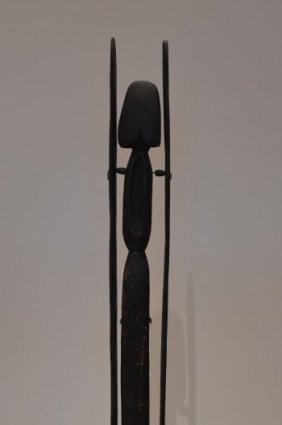  Louise
Bourgeois (1911-2010). Sleeping Figure. 1950. Painted
balsa wood. Frederick Kiesler (1890-1965). Totem for All
Religions. 1947.
 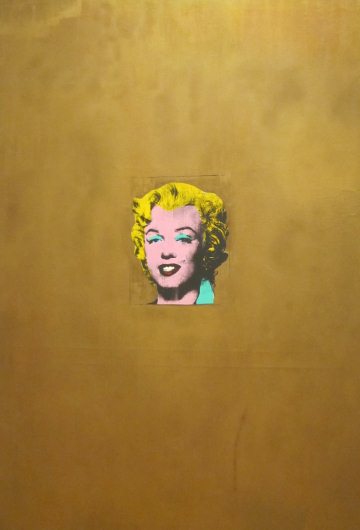 Andy Warhol
(1928-1987). Double Elvis. 1963. and also Gold
Marilyn Monroe. 1962. Both silkscreen ink on synthetic polymer paint canvas.
Warhol made this painting the year screen legend Marilyn Monroe committed
suicide. he painted the canvas an iridescent gold and silkscreened the star's
face in the centre of the composition. Like other paintings that feature
Monroe's likeness, this work is based on publicity still for the 1953 movie
Niagara. By duplicating a photograph known to millions, Warhol undermined the
uniqueness and authenticity characteristic of traditional portraiture, instead
presenting his subject as an infinitely reproducible image. I'm tired after
reading it. But we were pleased to be at least standing in front of a couple of
images we are familiar with.
 Lyubov
Popova (1889-1924). Painterly Architectonic. 1917.
Oil on canvas. In 1919 Popova described painting as a "construction," the
building blocks of which were colour and line. In this work, brightly coloured,
irregular shaped planes are layered against a neutral background. The curved
bottom edge of a gray shape emerging from beneath a red triangle and a white
trapezoid suggests three-dimensionality, while the vibrant colours and jutting
edges that seem to extend beyond the frame evoke energetic movement. Painterly
Architectonic is one of a series of works Popova created between 1915 and 1919
in response to Kazimir Malevich's Suprematist paintings (on display in this
gallery). Her definition of painting as a constructive process also recalls her
engagement with the materially based abstraction of fellow Russian Vladimer
Tatin, in whose teaching studio she worked.
 This was
the end, Bear said Enough, I want to go, I cannot take
any more of this crap. I did ask if we could could nip
in to the shop for a quick look, quick it was when Bear saw the
prices.
ALL IN ALL MORE RESEARCH AND EXPOSURE NEEDED,
CONVERSION, NOT SO SURE
I STILL THINK IT'S A LOAD OF BO - - -
CKS
|